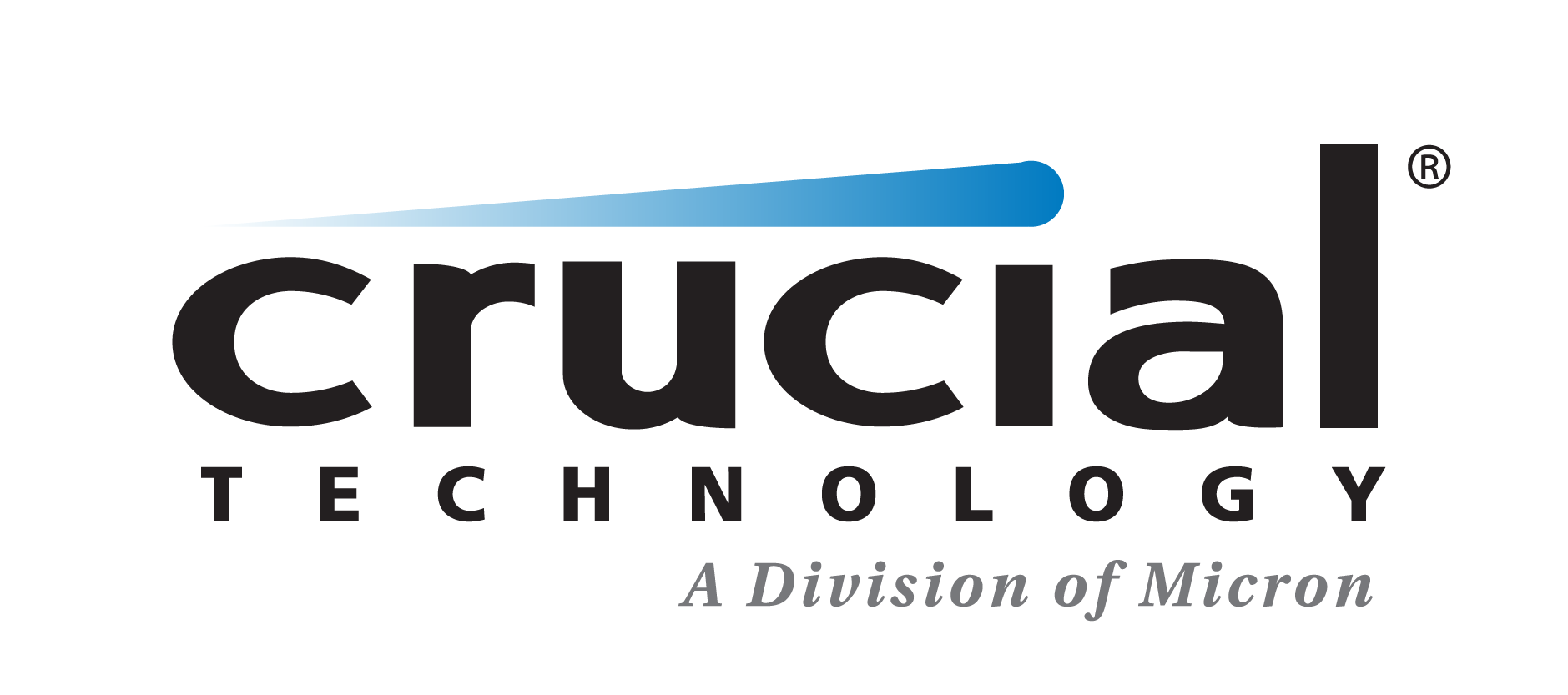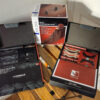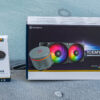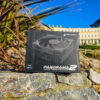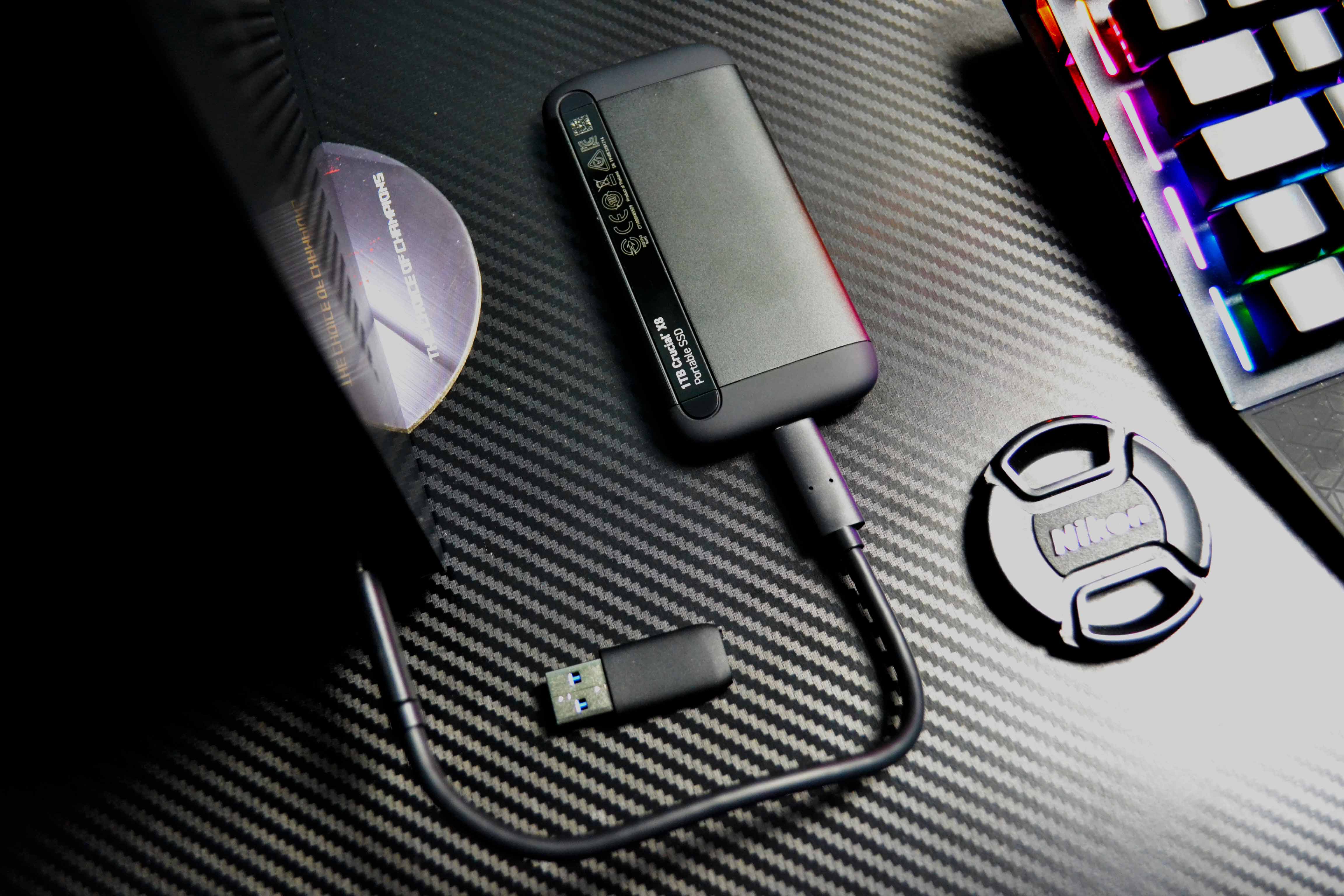
This X8 is an external SSD that promises write speeds above 1 GB/s, which is an impressive number for any USB storage based device. It achieves this by using a mixture of NVMe QLC cells (basically the same technology we saw in our review of their P1 NVMe M.2 drive) with further improvements which are specific to external storage devices. Of course all of this is achieved if your computer has a USB 3.2 Gen2 (Type C) in order to have access to the full 10 Gb/s bandwidth. Also it comes with a Type A adapter to facilitate a wider compatibility but at half of the speed (5Gb/s).
First about Crucial
Crucial is a global brand of Micron Technology, Inc., one of the largest memory and flash storage manufacturers in the world also ranked among the Top 5 Semiconductor producing companies in the world.
They make computer memory upgrades (DRAM) and solid state drives (SSDs), and offer more than 250,000 upgrades for over 50,000 systems.
Prices and Availability
Things are pretty simple, only two storage options available, either a 512 GB priced at $119.95 or a 1 TB flavor, for $164.95. We are reviewing today the 1 TB model.
Presentation and Specification
*Courtesy of their website.*
The X8 marks Crucial’s first high speed mobile SSD solution which:
Phenomenal Speed
Wherever you are, access your games, photos, and videos quickly — even offline. With read speeds up to 1050MB/s, you can load files up to 1.8x faster than most portable SSDs, 7.5x faster than portable hard drives, and 100x faster than USB flash drives.
Works with a Broad Range of Devices
Increase storage capacity for nearly any computer, tablet, phone, or console. Works with Windows, Mac, iPad Pro, Chromebook, Android, Linux, PS4, and Xbox. Connect with a USB-C 3.2 Gen2 interface or use our included adapters for USB-C or USB-A connections.
Built for the Toughest Conditions
Indoors or outdoors, at home or off the grid, the X8 is manufactured to be durable, rugged, and compact. Tested against extreme temperatures, shock, vibration, and even a 7.5-foot drop, you can trust that your drive will withstand the elements.
Sleek Style Innovative Design
Form meets function with the Crucial X8. Built with a unibody core of anodized aluminum, the case not only looks and feels great, but dissipates heat efficiently to maximize performance.
Complete Data Protection
Store your photos, videos, and files with confidence. You can use Windows Backup, macOS Time Machine, Windows Bitlocker to Go, and Apple FileVault, along with third-party endpoint-protection software suites like Symantec and McAfee.
A Reputation for Reliability
When you need ultimate peace of mind, trust the expert quality and engineering innovation of Crucial, a brand of Micron®, one of the leading flash storage manufacturers in the world. The Crucial X8 Portable SSD is backed by a 3-year limited warranty worldwide. Enjoy comprehensive support materials, such as operating instructions for various platforms and articles on maximizing your drive’s performance.
They claim, besides the speed, a multi-platform compatibility which is very welcomed and everything is backed by a 3 years warranty. Specs wise, the only numbers to look are the maximum bandwidths depending on what USB interface you use - 10Gb/s for USB 3.2 Gen2 Type-C to Type-C USB cable or 5Gb/s if you use the USB 3.2 Gen1/USB 3.0 Type-C to USB-A adapter.
Visual Inspection
It comes in a highly similar design to what Crucial uses in its SSD line-up. On the front we have the capacity and then the rated speed is in the right corner while on the left, it states that it is compatible with almost any device.
Not much is happening on the back besides a quick reference to the transfer speeds and that they will vary depending on your device.
The sides complete the compatibility list along side the warranty and shows us a glimpse of the actual size of the device.
The external SSD is securely nested inside a plastic tray and comes with a quick user’s guide along side the Type-C cable with a USB Type-A adapter.
The X8 has a very sleek and minimalist unibody core made of anodized aluminum which will help with heat dissipation. Also both ends are rubberized for drop protection up to a claimed 7.5 feet.
It comes with a Type-C to Type-C USB cable and a Type-C to Type-A adapter. Notice that the adapter must be pluged in a certain way.
Overall, the X8 is smaller than a regular 2.5″ drive enclosure.
Let’s test this puppy out.
Testing methodology
* Synthetic and real life big file transfer tests - a game folder of 50 GB of mixed files
* All test subjects have identical content - at around 5-10% used space
* All SSDs were secure-erased before our tests started
* Steps have been taken to ensure that the CPU’s power-saving features don’t interfere with any of our results. All of the CPU’s low-power states have been disabled.
* In order to minimize random variation, each of the real-life performance tests are run a few times with reboots in-between tests to minimize the impact of disk cache.
* (SATA SSDs only) Make sure you use a SATA 6Gbps capable motherboard and a matching cable to avoid bottle-necking. Then double check in the BIOS that you have the AHCI mode activated for another maximum performance tip.
* Specific to the Crucial X8, we will test it on both USB 3.1 Gen1 (“Blue” 5 Gbps ports) and 3.1 Gen2 (“Red” 10 Gbps ports) and on two different computers since our main PC, with the ASUS ROG STRIX B450i motherboard, doesn’t have any native Type-C USB ports (just 3.1 Gen1 & 3.1 Gen2 Type-A). Hence, we will also test on an ASUS ROG CROSSHAIR EXTREME X370 board which has a native 3.1 Gen2 Type-C port. On paper USB 3.1 Gen2 Type-A has the same theoretical bandwidth as the Type-C but this is good chance to see how it works on different chipsets (X370 vs B450i) as well.
Hardware used:
- CPU: AMD Ryzen 7 1700 AM4 - 8c/16t @ 65W TDP
- CPU Cooler: Noctua L9i chromax.black
- CPU Cooler Adapter: Noctua L9i AM4 adapter kit
- CPU Cooler PC2: Be Quiet! Dark Rock SLIM 120 mm
- Motherboard : ASUS ROG STRIX B450-i Gaming mITX
- Motherboard PC2: ASUS ROG CROSSHAIR X370 EXTREME E-ATX
- RAM: 16GB DDR4 Team Group Vulcan Z 3200 MHz
- Boot SSD: Samsung M.2 970 PRO 2TB TLC
- Video card(s): EVGA GTX 1080 FTW 8G
- GPU PC2: ASUS STRIX GTX 1060 6G
- PSU: Corsair SF600 SFX Gold
- PSU CP2: Be Quiet! Power Zone 750W Modular
- Case: Dan A4-SFX V4
- Case fan: Noctua NF-A9x14 HS-PWM chromax.black
- Extra Fans PC2: Be Quiet! Silent Wings 3 140 mm
Software:
- Windows 10 Pro x64 Version 1909
- HD Tune Pro v5.00
- ATTO v4.01
- Crystal Disk Mark v6.0.0
Competition:
- Samsung 970 EVO 2TB TLC M.2 PCIe NVMe
- Samsung 860 PRO 1TB QLC SATA 2.5″ SSD + Orico 2.5″ External USB 3.0 Drive Enclosure
- Crucial P1 M.2 1TB QLC PCIe NVMe
Testing and Results
First, we start with HD Tune Pro – which is a hard disk / SSD utility with many functions. It can be used to measure the drive’s performance, scan for errors, check the health status (S.M.A.R.T.), securely erase all data and much more. Here we have the X8’s average speed results and IOPs for the ‘Random’ size cluster.
From left to right we have the 3 main variations - the X8 on the “Blue” 5 Gbps USB 3.1 Gen1 ports with the included adapter, then on the “Red” 10 Gbps USB 3.1 Gen2 port, with again the same adapter and finally on the Type-C native 10 Gbps USB 3.1 Gen2 port but on the second testing PC.
The following graph will show us the complete picture when compared to other drives.
Moving to the next utility - Crystal Disk Mark – this one is designed to quickly test the performance of your drives. The program supports four tests: “Seq Q32T1″ (sequential read/ write with multiple threads and queues), “4K Q32T1″ (random read/ write with multiple threads and queues), “Seq” (sequential read/ write with a single queue and thread) and “4K” (random read/ write with a single queue and thread).
We see the full bandwidth is displayed for the “read” test in this benchmark for all test subjects.
Moving to the “write” test, we get the same hierarchy.
To conclude the synthetic test, ATTO – is another performance measurement tool to test any manufacturers RAID controllers, storage controllers, host bus adapters (HBAs), hard drives and SSD drives.
Now for the file transfer tests. Here we have a game folder at over 50 GB of mixed files which will be copied onto the X8.
Analysis
First of all, we encountered a bottleneck from the Crosshair motherboard, either from bad drivers or the ASMedia controller because we saw worse results on the USB 3.1 Gen2 Type-C than the B450 board. We even tried the Type-A port on the X370 but the numbers were the same, with a 20% negative difference. If we look at the specs from both motherboards, we can see that the bandwidth comes natively from the B450 chipset for the ITX board while the X370 one uses a 3rd party controller chip from ASMedia for the same USB 3.1 Gen2 interface. So, it is down really to manufacturers’ implementation.
In all synthetic test we got the same overall numbers, which were very close to the theoretical maximum possible, on the B450 motherboard with the USB 3.1 Gen2 Typer-A “Red” ports, even with the included adapter from the Crucial X8. So, all good there considering this is a USB storage device.
When it comes to transferring big chunks of data, because that’s why you would get this, for example as a Steam library portable option or as a back up, the Crucial X8 delivers with good constant speeds. On the 5 Gbps USBs we got 300 MB/s write which is amazing considering that a cheap USB 2.5″ enclosure will not even get you HDD speeds even with an SATA SSD inside, like you saw in our tests. Then on the 10 Gbps USB on the B450 motherboard we got 475 MB/s all the way through considering we transferred a big folder with 50 GB of mix files. Too bad our X370 motherboard under-performed on both 10 Gbps ports with just 343 MB/s as a constant average.
Even with these tests, the enclosure was only lukewarm to the touch through the entire period, with a recorded 40-45 °C. Thus, we can state that the heat dissipation works very well.
There is nothing negative to report and the X8 performed as advertised all the way through.
Conclusion
Crucial, basically, delivers with the X8, the best performing USB ‘stick’/external storage solution that you can get, given the price and the capacity options. It is cool, light, highly portable, rugged and even on a 5 Gbps port it will still be faster than almost any regular USB stick or 2.5″ SATA HDD/SDD with a 3rd party enclosure. The closest thing is Samsung’s T5 series, in a Thunderbolt option, but those are 3x times the price than the X8 for the same capacity. Of course, to enjoy the full bandwidth you will need a 10 Gbps port but most 2019 motherboards will have at least one. Overall, the Crucial X8 gets our maximum mark since it is a best buy and truly performs and this being said, I can finally retire my SATA SSD on a slow 2.5″ enclosure and enjoy the amazing upgrade !
The good:
+ The best 1TB external option so far
+ Sleek design
+ Durable and shock proof up to a 7.5 feet drop
+ High build quality
+ Included Type-C to Type-A adapter
+ Highly portable
+ 3 years warranty
The bad:
- Mandatory 10 Gbps USB connector USB 3.1 Gen2 or 3.2 Gen2 to access the full bandwidth
- No official TWB endurance ratings but expect this to last you a long time at least as the P1 M.2
Glob3trotters “Editor’s Choice!” Award - 5 out 5



